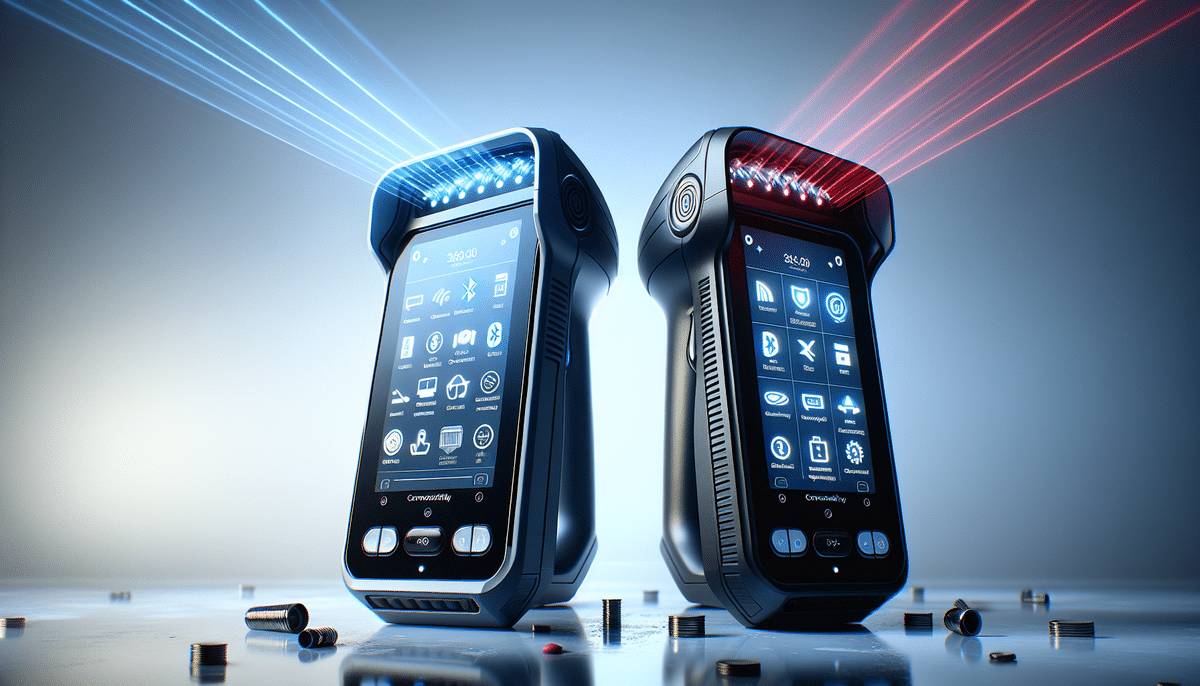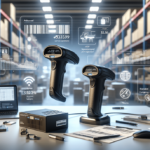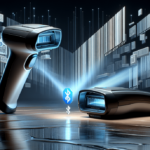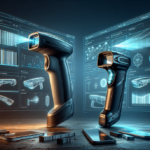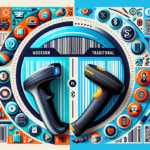Socket Mobile S700 vs Zebra DS8178
In this comprehensive comparison, we evaluate the Socket Mobile S700 and Zebra DS8178 barcode scanners. Both devices are renowned for their reliability and performance in the retail and manufacturing sectors. This analysis covers their design, features, performance metrics, battery life, connectivity options, and user interfaces. By examining the advantages and disadvantages of each scanner, we aim to help businesses make an informed decision tailored to their specific needs.
Key Features Comparison
Design and Build Quality
The Socket Mobile S700 is designed with a sleek and lightweight form factor, featuring a rubberized grip that ensures comfortable handling during extended use. It is rated IP54, providing protection against dust and water [1]. In contrast, the Zebra DS8178 boasts a rugged construction suitable for harsh environments, with an IP42 rating. It is built to withstand drops from up to six feet, making it ideal for demanding industrial settings [2].
Performance
The Socket Mobile S700 excels with a scan rate of 100 scans per second, enabling rapid processing of large inventories. It supports various barcode types, ensuring high accuracy and efficiency. The Zebra DS8178, on the other hand, offers an extended scan range of up to 24 inches, which is particularly useful for scanning items placed on high shelves or in hard-to-reach areas. Both scanners utilize advanced imaging technologies to ensure reliable performance across different environments.
Battery Life
The Socket Mobile S700 is equipped with a rechargeable battery that lasts up to 16 hours on a single charge, suitable for full-day operations. Meanwhile, the Zebra DS8178 offers a more extensive battery life, supporting up to 50,000 scans per charge and featuring a hot-swappable battery design. This allows for uninterrupted workflow, as users can replace the battery without halting operations [2].
Connectivity Options
Connectivity is a critical factor for barcode scanners. The Socket Mobile S700 utilizes Bluetooth 4.2 and HID modes, providing a range of up to 330 feet, which is advantageous for large warehouses or expansive retail spaces. Additionally, it includes a USB port for direct computer connections and charging. The Zebra DS8178 offers both Bluetooth 4.0 and NFC (Near Field Communication) connectivity, allowing for quick pairing with compatible devices without manual setup. Its effective range is up to 300 feet, suitable for most work environments [2].
User Interface
Both scanners feature user-friendly interfaces. The Socket Mobile S700 includes customizable sound and LED indicators that provide immediate feedback upon successful scans. Its ability to connect to multiple devices via Bluetooth enhances flexibility and mobility. The Zebra DS8178 is equipped with a multi-color LED indicator and haptic feedback, offering tactile confirmation of scans. Its intuitive interface is complemented by PRZM Intelligent Imaging technology, which ensures accurate reading of damaged or poorly printed barcodes [2].
Pricing
Pricing is a significant consideration for businesses. The Socket Mobile S700 is priced around $400, presenting an affordable option for those seeking a high-quality scanner with essential features. In comparison, the Zebra DS8178 is priced approximately at $650. While it is more expensive, the Zebra scanner's rugged build, extended battery life, and advanced features justify the higher cost for businesses operating in more demanding environments [2].
Pros and Cons
Socket Mobile S700
Pros:
- Lightweight and ergonomic design for comfortable use
- High scan rate of 100 scans per second
- IP54-rated for dust and water resistance
- Affordable pricing around $400
- Long battery life of up to 16 hours
Cons:
- Limited scan range compared to Zebra DS8178
- Less rugged, making it less suitable for extremely harsh environments
Zebra DS8178
Pros:
- Robust and durable design ideal for harsh conditions
- Extended scan range of up to 24 inches
- Long battery life supporting up to 50,000 scans per charge
- Supports both Bluetooth and NFC connectivity
- Advanced PRZM Intelligent Imaging technology for enhanced scanning accuracy
Cons:
- Higher price point around $650
- Heavier and bulkier design compared to Socket Mobile S700
Choosing the Right Barcode Scanner for Your Business
Selecting between the Socket Mobile S700 and Zebra DS8178 depends on your business's specific requirements:
- Environment: If you operate in a rugged or industrial setting, the Zebra DS8178's durable build is advantageous.
- Scan Volume: For high-volume scanning with rapid processing, the Socket Mobile S700's high scan rate is beneficial.
- Connectivity Needs: Businesses requiring versatile connectivity options, including NFC, may prefer the Zebra DS8178.
- Budget: For cost-sensitive operations seeking reliable performance, the Socket Mobile S700 offers excellent value.
- Battery Requirements: If extended battery life is critical, the Zebra DS8178 provides longer operational periods without recharging.
Assess your operational environment, scanning frequency, and connectivity preferences to determine which scanner aligns best with your business objectives.
Conclusion: Which Barcode Scanner is the Best Choice?
Both the Socket Mobile S700 and Zebra DS8178 are exceptional barcode scanners that cater to different business needs. The Socket Mobile S700 stands out with its lightweight design, high scan rate, and affordability, making it ideal for retail environments and businesses with high scanning volumes. Conversely, the Zebra DS8178 offers superior durability, extended scan range, and advanced connectivity options, making it suitable for industrial settings and businesses operating in challenging environments.
Ultimately, the best barcode scanner for your business depends on balancing factors such as environment, scan volume, connectivity needs, and budget. By carefully evaluating these aspects, you can select a scanner that enhances operational efficiency and supports your business's growth.















